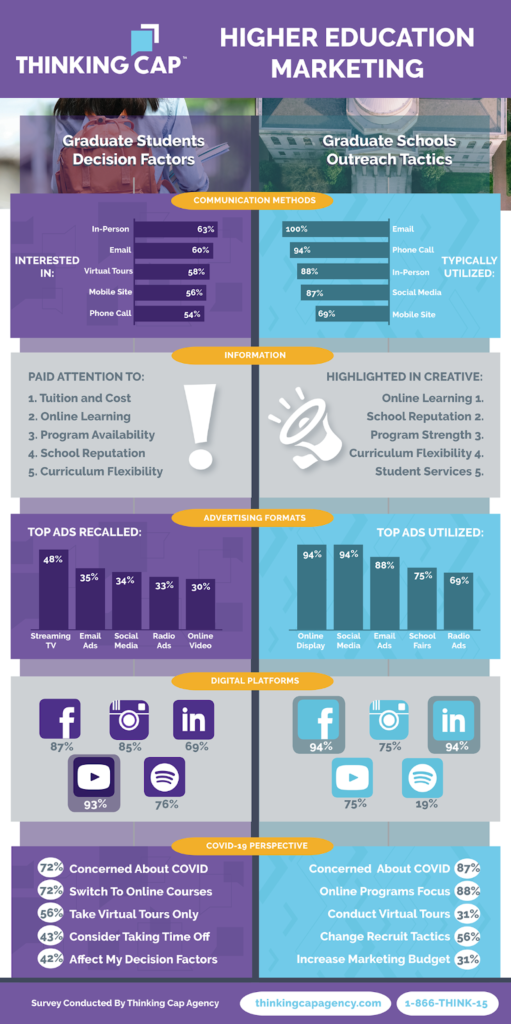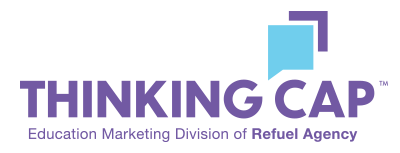Your enrollment marketing team has worked hard to craft a graduate recruitment strategy to reach your prospective students and influence them to enroll. But is your strategy actually working? We conducted research to determine how effective your recruitment strategies actually are—based on data from your prospective graduate students.
So, are your chosen strategies, channels, and messaging working? Your future graduate students told us…

You tried: Emails and Phone Calls
Our research found that 100% of higher education institutions utilized email in their outreach efforts, and 94% used phone calls. So we then asked your prospective graduate students what their preferred method of outreach was.
What made the grade: Email. We found that emails are working for graduate student recruitment—60% of prospective graduate students indicate that they pay attention to emails, and they are the second most effective means of outreach.
What failed: Phone calls. But when it comes to phone calls, graduate students aren’t picking up. In fact, phone calls are actually the least effective form of outreach (after in-person, email, virtual tours, and mobile sites). And this makes sense: your prospective graduate students are busy. Many have full-time jobs and caregiving responsibilities, making them less able to answer the phone.
The takeaway: The way you reach out to students matters. Use communication tactics that are compatible with your busy prospective students’ lives and that make a lasting impression.
Read next: Video is the Future of Enrollment Marketing
Your Messaging: Online Learning and Your School’s Reputation
What you highlight in your marketing creative influences your prospective graduate students’ idea of an ideal school. We found that the top things higher education institutions highlight in their creative are their online learning and their school’s reputation. But what do graduate students actually care about?
What made the grade: Online learning. The highlight of online learning was spot on. Graduate students are looking to fit their education into their busy lives.
What failed: Reputation. School reputation is actually much lower down on your prospective student’s list of importance. It is still a factor but only when weighed against affordability and programs.
The takeaway: The first thing graduate students care about is the tuition and cost. Before anything else, they are needing to confirm that they can afford to go back to school. Graduate students are making decisions about feasibility long before they narrow down schools based on reputation. Continue highlighting online education to ensure students that they can fit school into their schedules, and emphasize information about your tuition and pricing.
You advertised on: Display and Social Media
The channels you use for your advertisements are just as important as what’s inside them. So where are higher education institutions currently advertising and where are graduate students looking at advertisements?
What could be improved: Our research found that 94% of higher education institutions advertised using online display and 94% advertised on social media. But we also found that these channels don’t actually provide the highest recall from prospective graduate students. Our research showed that 48% of your prospective students recalled streaming TV ads, and 35% recalled email ads.
The takeaway: Choose your channels wisely. Prioritize streaming TV and email ads to make the best impact on your prospective graduate students.
Read Next: How to Recruit Online Students
Your top digital platform: Facebook
The digital platforms your higher education institution chooses determines the nature of your online presence and how your future students are interacting with you.
We found that the top platform higher education institutions use is Facebook, with 87% of higher education institutions indicating they use the platform, followed shortly by Instagram at 84%. But where are your prospective graduate students logging on?
What could be improved: Add LinkedIn. Our research found that 94% of graduate students use Facebook. But it also showed that 94% of graduate students are using LinkedIn, compared to higher education’s just 69%.
The takeaway: Your prospective students are busy professionals, and they’re using LinkedIn not only to network professionally, but also to explore their education options. To make an impact, show up where they are.
Your COVID-19 perspective: You expressed concern
COVID-19 posed new challenges for higher education institutions to tackle in the way that they communicated with students and addressed their concerns. So, did higher education institutions successfully adapt their messaging and focus to meet the needs of their prospective students?
What made the grade: COVID messaging. We found that 87% of higher education institutions expressed concern about COVID-19, and that aligns with the 72% of graduate students that also expressed concern. Additionally, 88% of higher education institutions focused on their online programs, and 72% of prospective graduate students have switched to online courses due to COVID-19.
The takeaway: Higher education institutions have responded to COVID-19 in line with what prospective graduate students care about. Continue expressing concern for what your prospective graduate students are concerned about and providing flexible options to empower your future students.
Elevate your enrollment marketing strategy with Thinking Cap Agency
If you’re looking to take your graduate school marketing strategy to the next level, Thinking Cap Agency can help. With over 30 years of experience through our sister agency, Refuel Agency, Thinking Cap provides the data-driven solutions to drive campaign results.
Contact us today to learn how we can leverage our proprietary data, tools, and analytics to bring more qualified graduate student enrollments.





